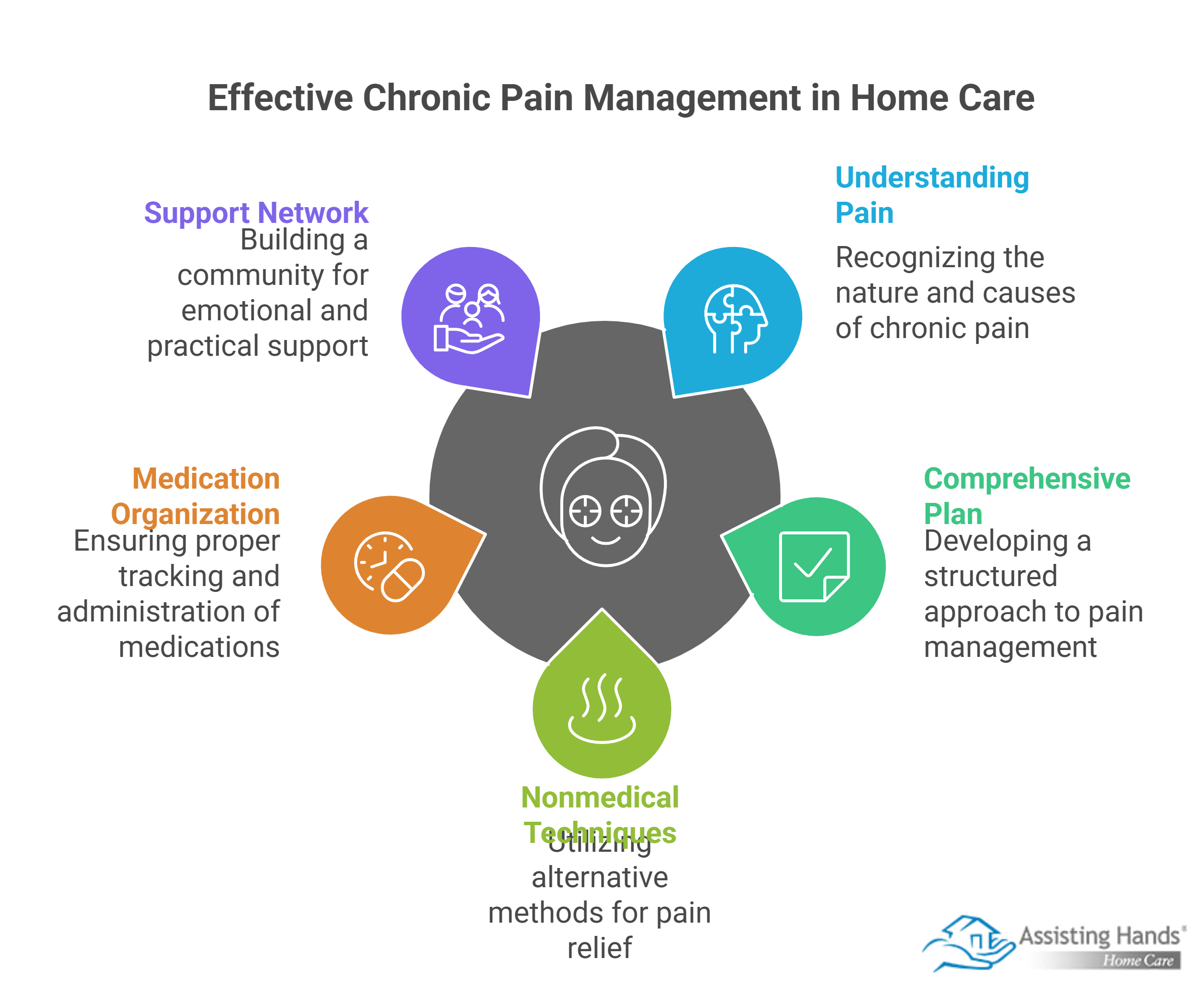
Table of Content
Caring for a senior loved one with chronic pain at home requires a thoughtful approach that balances health management with emotional support. Long-term home care presents unique challenges, but with the right strategies, you can help your loved one maintain comfort and dignity. This guide explores practical methods for managing chronic pain effectively in a home care setting.
Understand Chronic Pain in Home Care Settings
Chronic pain affects millions of people and can stem from various conditions including arthritis, fibromyalgia, neuropathy, or past injuries. Unlike acute pain that signals immediate harm, chronic pain persists for months or years, often without a clear underlying cause.
In home care environments, managing chronic pain becomes more complex because:
- Traditional medical supervision is limited
- Pain levels can fluctuate throughout the day
- Environmental factors play a significant role
- Family caregivers may lack specialized training
- Access to immediate medical intervention is reduced
Understanding these unique challenges helps caregivers develop more effective pain management strategies tailored to the home environment.

Create a Comprehensive Pain Management Plan
A successful pain management plan requires collaboration among healthcare providers, seniors, and caregivers. Start by working with your loved one’s physician to establish clear protocols for medication organization, including dosing schedules and emergency procedures.
Document pain patterns by maintaining a daily pain journal that tracks:
- Pain intensity levels (using a 1–10 scale)
- Triggers that worsen or relieve symptoms
- Medication timing and effectiveness
- Sleep quality and duration
- Mood and emotional state
This information helps healthcare providers adjust treatment plans and identifies patterns that might not be obvious during brief medical appointments. Regular communication with the medical team ensures the plan evolves with your loved one’s changing needs.
Hiring professional caregivers is one of the best ways to help older adults address pain. If you have a senior loved one who needs help maintaining a high quality of life while aging in place, reach out to Assisting Hands Home Care, a leading provider of homecare families can rely on. All of our caregivers are bonded, licensed, and insured, there are no hidden fees, and we never ask our clients to sign long-term contracts.
Use Nonmedical Pain Relief Techniques
Beyond medication, numerous nonpharmaceutical approaches can significantly reduce chronic pain. Heat and cold therapy remain among the most accessible options for home caregivers. Heating pads, warm baths, or ice packs can provide targeted relief depending on the type of pain and individual preferences.
Gentle movement and stretching exercises, when approved by healthcare providers, help seniors maintain mobility and reduce stiffness. Chair-based exercises or supported walking can be particularly beneficial for those with limited mobility.
Environmental modifications also play a crucial role:
- Ergonomic seating and supportive cushions
- Adequate lighting to reduce eye strain
- Temperature control for comfort
- Noise reduction to promote rest
- Easy-to-reach placement of frequently used items
Relaxation techniques such as deep breathing exercises, meditation, or listening to calming music can help seniors manage both pain and the anxiety that often accompanies chronic conditions.
Helping an older adult mitigate pain can be a challenging task. If your elderly loved one needs help maintaining a high quality of life while aging in place, reach out to Assisting Hands Home Care, a trusted provider of Pearland senior care. Our caregivers provide transportation to and from medical appointments and social events, nutritious meal preparation, assistance with daily exercise, and help with everyday tasks like bathing, grooming, and light housekeeping.
Organize Medications
Proper medication organization forms the backbone of chronic pain care at home. Establish a reliable system for tracking medications, including prescription drugs, over-the-counter pain relievers, and any supplements.
Use pill organizers or medication reminder apps to prevent missed doses or accidental double-dosing. Keep an updated list of all medications, including dosages and timing, easily accessible for emergency situations or medical appointments.
Store medications safely and securely, especially opioid pain relievers, which require special handling. Monitor for side effects and maintain open communication with healthcare providers about medication effectiveness and any concerns.
Never adjust medication dosages without medical supervision, and be aware of potential interactions between different medications or supplements.
Build a Support Network
Chronic pain affects not only the senior but also the entire family. Building a strong support network helps you distribute caregiving responsibilities and provides emotional support for everyone involved.
Connect with local support groups for chronic pain patients and caregivers. Many communities offer in-person meetings, while online groups provide 24/7 accessibility. Professional resources such as visiting nurses, physical therapists, or social workers can provide specialized expertise and respite for primary caregivers.
Family members and friends can contribute in various ways:
- Taking shifts for medication reminders
- Assisting with household tasks
- Providing transportation to medical appointments
- Offering emotional support and companionship
- Helping with documentation and communication with healthcare providers
Don’t hesitate to accept help when offered, and be specific about needs when asking for assistance. Managing chronic pain at home requires a team effort, and building that team early prevents caregiver burnout and ensures consistent care.
Living with serious health conditions can make it challenging for seniors to age in place. However, they can maintain a higher quality of life with the help of professional live-in care. Pearland seniors can benefit from assistance with meal prep, bathing, transportation to the doctor’s office, medication reminders, and much more. If you need professional home care for your aging loved one, our Care Managers are just a phone call away. Reach out to Assisting Hands Home Care today.








